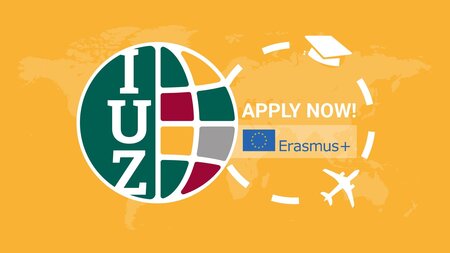Information for Incoming Students (ERASMUS and other)
This website is for students from abroad. Please read all the information provided below carefully.
Page contents
- Steps in the Organisation of your Erasmus Exchange
- How to Register for Courses
- How to Obtain ECTS Credits
- Orientation Week
- Important Links
- Practical Advice and Further Information
- Frequently Asked Questions (FAQ)
Steps in the Organisation of your Erasmus Exchange
Before you come
Erasmus students who plan to study English at TU Chemnitz within the Erasmus+ framework need to fill in a learning agreement at their home university in which they indicate which courses they wish to take. Our BA programme comprises the subject areas Linguistics, English/American Literature and British/American Cultural Studies, on which you should focus. You can choose to attend courses in any of these areas.
While the specific courses may change each semester, there are some typical courses that are usually offered. Please use this overview of courses typically offered to fill in your learning agreement for the application. This agreement has to be accepted first by the representative at your home university and then by the responsible coordinator at TU Chemnitz (Prof. Sandten for the Milan and Cyprus exchanges, Prof. Sanchez-Stockhammer for all others). Our International Office (IUZ) will send you a confirmation of acceptance, which you may need in order to obtain a visa (if you need that).
After you have arrived
On arrival at TU Chemnitz, you need to adjust your learning agreement by filling in the actual courses that are offered at the English department during the time of your stay. Detailed information on the actual courses can be found in the current KoVo (Kommentiertes Vorlesungsverzeichnis).
Once you have modified your learning agreement with the specific classes of the current semester, the learning agreement has to be signed by the departmental Erasmus coordinator (Prof. Sandten for the University of Milan and Dr. Isabelle van der Bom for all other universities).
How to Register for Courses
Please register for your selected courses with the respective teacher. Information on the registration procedure for each course can be found in the detailed course description (see link KoVo).
How to Obtain ECTS Credits
As a rule of thumb, lectures (Vorlesungen) and practical courses (Übungen) are worth 3 ECTS credits; seminars (Seminare) are worth 5 ECTS credits. More details can be found on the webpage with information on the application of the European Credit Transfer System to our department.
If your class involves a PVL (Prüfungsvorleistung), you need to do an ungraded assessment (e.g. a presentation or a brief essay) during the teaching period. This grants you admission to the final, graded assessment, the PL (= Prüfungsleistung), which needs to be accomplished after the end of the teaching period.
Orientation Week
Incoming students are welcome to participate in the Orientation week, which provides helpful information about practical matters and studying at TU Chemnitz. This also includes a guided tour of the campus with its facilities.
Important Links
Please follow the links below in order to obtain all the relevant information and try to avoid sending us individual emails regarding these matters.
- Information about important dates, including start and end dates of the semesters can be found in the academic calendar.
- General information about studying in Chemnitz, what to do after you arrived etc. can be found on the webpages of the International Office (IUZ).
- Help in finding your way around Chemnitz before and after your arrival can be arranged via the Student Buddy Programme, organised by local students.
- Information on how to book accommodation at local halls of residence can be found on the pages of the Studentenwerk Chemnitz-Zwickau.
Practical Advice and Further Information
Almost all classes at our department are taught in English, but if you study in Germany, it is advisable to have a basic knowledge of German to find your way round. To make this easier for you, the International Office offers German-language classes for international students in collaboration with the Language Centre.
The academic year consists of a winter semester (October to March) and a summer semester (April to September). Each semester comprises a 15-week teaching period and several weeks of self-study to accomplish the graded assignments.
If you want to learn more about the history of Chemnitz and its university, you can get a quick impression in the Brief History of Chemnitz.
Frequently Asked Questions (FAQ)
You can find information on the courses we offer in our course catalogue (KoVo = kommentiertes Vorlesungsverzeichnis [annotated course catalogue]).
Some of our courses are offered during the summer, other courses are offered during the winter terms. You can check older versions of the course catalogue to see what we usually offer during summer and winter terms. Please note that classes of a particular type (e.g. the second-semester BA seminar Applied and Cognitive Linguistics) may have a subtitle that specifies their content in a particular semester, e.g. Corpus Linguistics.
If you listed a course in your Learning Agreement that is not offered during your stay, you can change your Learning Agreement in consultation with the Erasmus Coordinator from your home institution and have it signed again by our TU Chemnitz representative.
Send an e-mail to the respective lecturer to let them know that you would like to register for their course.
Get in touch with the respective lecturer and discuss it with them. It may be possible to earn extra credits in exchange for extra assignments. For instance, exchange students may receive 5 ECTS (instead of the regular 3 ECTS) in all lectures in English linguistics. To qualify, you need to pass the regular examination (which determines your grade) and additionally produce a portfolio of the lecture and conduct revision at least once.




